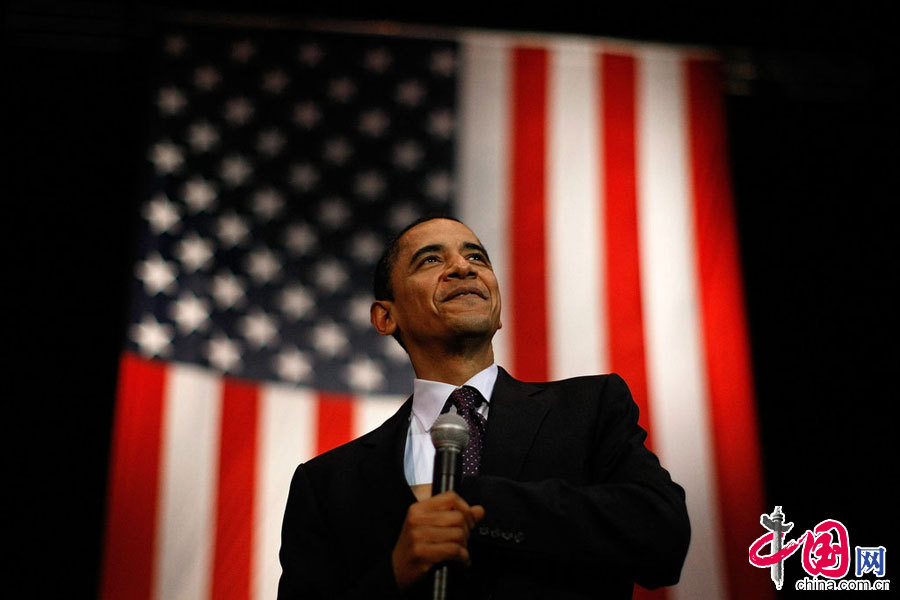Obama accomplishes 'mission impossible'
 0 Comment(s)
0 Comment(s) Print
Print E-mail China.org.cn, November 7, 2012
E-mail China.org.cn, November 7, 2012
U.S. President Barack Obama accomplished "mission impossible" on Tuesday night as he won re-election in one of the closest presidential races in modern U.S. history amid a dismal economic situation.
This victory was a new record set by Obama, who made history in 2008 by becoming the first black U.S. president, as a sitting president since World War II to win a second term when unemployment is above 7.2 percent.
White-hot race
This year's presidential race was so close that neither of the two candidates had enjoyed a comfortable lead in polls along the way. And the last-minute reversal of momentum in favor of Republican challenger Mitt Romney following the first presidential debate in early October even added to the uncertainty.
Back in later September, all polls pointed to the advantage, albeit slight, of Obama, who enjoyed a five-point lead over Romney whose campaign suffered one after another blows due to his own mishaps.
The biggest blow to Romney was from a secretly-recorded video revealed in September, which showed him telling rich donators that he did not care about 47 percent Americans who did not pay income tax, relied on the government and was unwilling to take personal responsibility.
Amid strong criticism of Romney's remarks, Obama started widening his lead over the Republican challenger. And before the Oct. 3 first presidential debate, it all seemed that Obama was on the way to seal the victory.
But after a surprisingly spirited performance of demonstrating enthusiasm, attacking Obama's poor economic records and showing flexibility on some key issues in the first presidential debate in Denver, Colorado, Romney reversed the momentum by resurrecting his campaign from despair and decline.
As a result, Romney's support in the polls resurged quickly and even took over lead from Obama in later October.
However, it has proved that Romney's resurrection came a bit too late, as many states already started early voting in later September. Early voters were not affected by Obama's weak performance at the first debate.
When it became clear that the whole race will hinge on the outcome of Ohio, which has 18 electoral votes, the final sprint to Election Day witnessed the fiercest tug of war between the two candidates, who focused on last-minute intensive campaigning in the buckeye state to win over undecided voters.
In what could be dubbed as the October Surprise, Hurricane Sandy suddenly battered the American East Coast on Oct. 29, causing widespread damage and loss of lives.
Obama earned a God-given opportunity to demonstrate his leadership through effectively directing the rescue disaster relief operations. He even won unexpected high praise from a major political rival -- New Jersey's Republican Governor Chris Christie, which surely boosted Obama's last-minute campaigning.
Breaking curse of unemployment
There has been a curse in U.S. election politics that no sitting president has won re-election when the unemployment rate is above 7.2 percent. It seemed that Obama was doomed to fail when he launched his re-election bid in April, when unemployment stood at 8.1 percent.
When former Republican President Ronald Reagan won re-election in 1984 despite a 7.2 percent unemployment rate, he was helped by an economic growth at 4.5 percent, which generated optimism among American voters.
In comparison, Obama could not count on the current U.S. economic growth which was only 2 percent in the first and third quarters and stood at 1.5 percent in the second quarter this year.
The unemployment rate had been hovering over 8 percent for 44 consecutive months since Obama took office in early 2009, before falling for the first time to 7.8 percent in September 2012. It then inched up to 7.9 percent in October.
However, banking on his incumbency and early planned political investments aimed at re-election, Obama tried very hard to generate optimism among voters by spreading the message that the worst time was over and that the economy was heading in the right direction under his leadership.
The Obama campaign touted the slogan "Forward," arguing for giving him four more years to lead the economy out of its mess, which he blamed on his unpopular Republican predecessor, George W. Bush.
By implementing a massive auto bailout and launching lawsuits over auto and steel subsidies against China in the World Trade Organization, Obama purposely helped save the struggling U.S. auto industry, which involves a great number of manufacturing jobs in key swing states such as Ohio and Michigan.
This strategy indeed worked in Ohio, where unemployment was far below the national level. Through campaign ads, the Obama team repeatedly reminded the voters of the success of his auto bailout, while sharply criticizing Romney's notorious New York Times Op-Ed "Let Detroit Go Bankrupt," which argued against the bailout.
With his new policy to exempt illegal immigrants who entered the United States as a kid from deportation, Obama also gained widespread support from Hispanic voters. He, the first black president, also enjoyed 95 percent of support among African Americans.
Obama, a charismatic leader who connects well with common people, also maintains a wide lead over Romney in terms of charm and likability. Thanks to his liberal positions of supporting same sex marriage, abortion and immigration reforms, Obama has also been holding a steady lead in support among young, female and minority voters.








Go to Forum >>0 Comment(s)